Are you an anime fan? Maybe it was anime that got you interested in Japan and Japanese culture. For many foreigners, anime might be how they started learning Japanese. There are many different genres of anime, from romance to science fiction.
But can we really learn Japanese from anime? If you can choose an anime that has a good use of Japanese, it will be a great advantage for you. Anime can also be an effective language immersion tool for you. You can learn Japanese directly from native speakers. It can also be an interesting and fun exercise in Japanese comprehension.
However, if you can learn official and organized Japanese as it is presented in official books, then you can learn Japanese more comprehensively and in depth, not just in everyday or casual conversations that are usually presented in anime.
Then, back to our topic, if you’re an avid anime lover, you may have noticed that similar anime quotes are used repeatedly across different anime genres, so let’s go through some of these infamous anime quotes that have helped many of us learn Japanese.
Also check out our comprehensive discussion of the most famous and meaningful anime phrases below!
Read also:
48 Most Popular Japanese Slang You Need to Know
What does “Kabedon (壁ドン)” Mean in Japanese?
How Hard is it to Learn Japanese?
Contents
Are there Any Japanese Anime Quotes that We Can Actually Use?
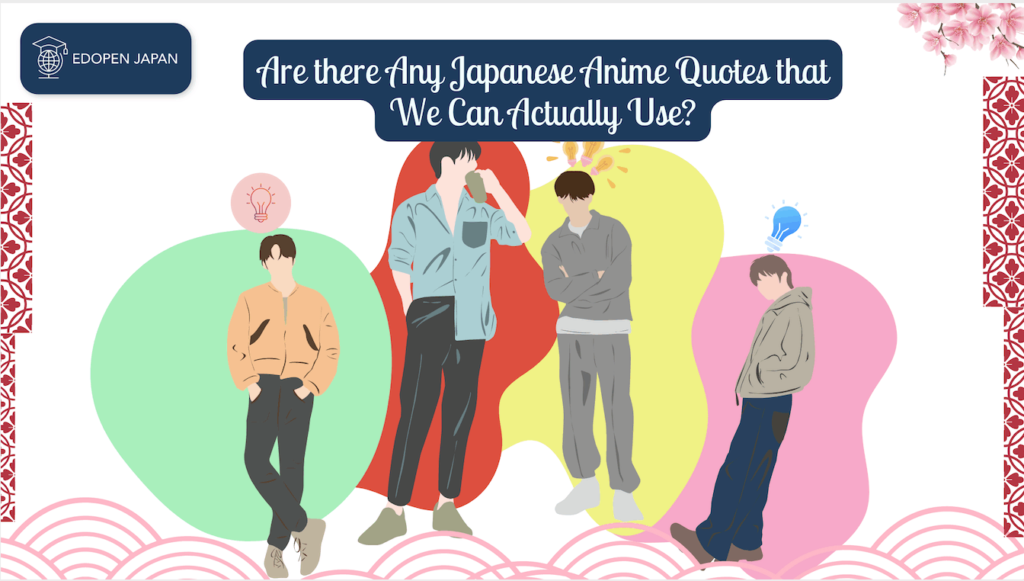
Many people say that they can understand Japanese by watching anime. Is this true? This answer is not entirely reliable because you first need a foundation to be able to understand the various conversations in anime.
Worse, many Japanese learners carelessly use phrases used in anime without researching what they actually mean and what situations are actually allowed to use those phrases in real life.
Many even just use slang phrases that are not appropriate for beginner Japanese learners. In fact, learning Japanese through anime will make it easier for you to improve your Japanese vocabulary. However, you have to be really careful to absorb all the vocabulary in the anime.
Also, it is very difficult to learn official and educationally recognized Japanese grammar if you want to learn it through anime. Because to master grammar as well as vocabulary, you need officially recognized learning sources and certified professional teachers.
However, there are also anime that use pretty good language and provide very meaningful messages. In addition, some of the phrases used are often used in everyday Japanese conversation. Read more about this in the next section.
12 Most Famous Anime Quotes in Japanese You Must Know
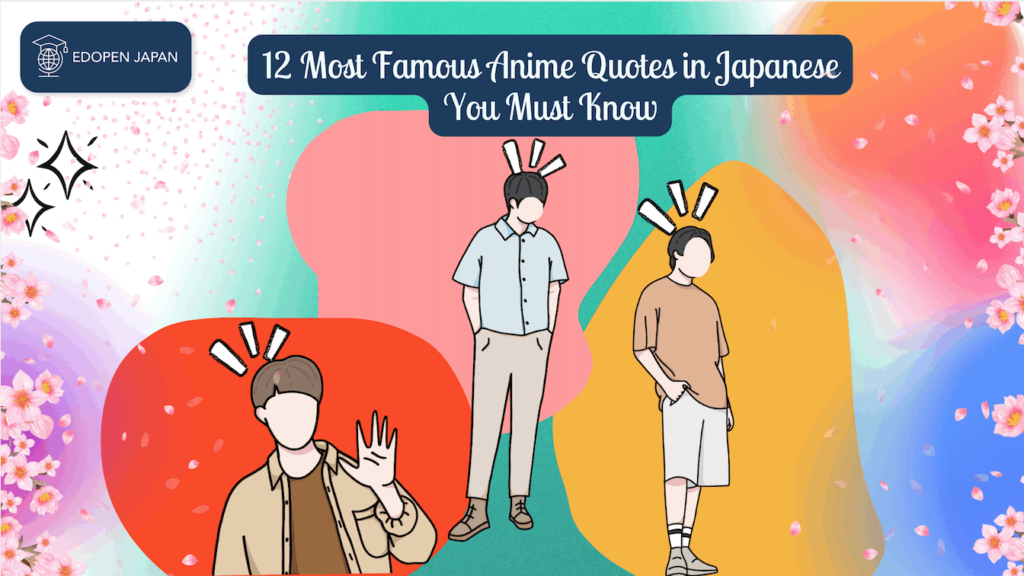
1. Shikkari shite(しっかりして)
Definition: Hang in there // get a hold of yourself
In many action genre anime, the phrase “Shikkari shite” is used repeatedly during fights, confrontations, and even discussions or meetings. It is often seen when a character is about to lose hope or their mind over some issue or circumstance in their situation, that this phrase is used to “knock some sense” into the lost soul.
When things start to go wrong, say “Shikkari shite” and pull yourself together. Everything will be fine and things will work out in the end.
Check this phrase out with: Damon slayer(鬼滅の刃:Kimetsu no yaiba)
2. Ittai douiu imi (いったいどういういみ)
Definition: What does it mean?
Loosely translated to show that the speaker has no idea or clue about what is going on. Sometimes the energy displayed with this quote shows complete and utter frustration at not understanding or grasping the meaning of the said conversation, sentence or situation.
A much more accurate portrayal in anime shows this phrase indicating “What the hell does that mean?” The character isn’t telling the viewers off, they’re just really upset because they don’t know what’s going on!
3. Chotto matte (ちょっとまって)
Definition: Wait! Wait a moment!
Imagine a scene where two characters are running and one falls behind. The one falling behind shouts “Chotto matte! – and tries to tell the other to wait for him or her. Wait up!
This quote also means wait a moment while I work on something and get back to you shortly. In short, it means wait for me, hold on a minute. Unlike in anime, in real life we can hear these phrases while queuing in the supermarket or waiting for a friend.
4. Chotto (ちょっと)
Definition: A little // Hold on // Wait a minute
A sub-branch of “chotto matte” is “chotto”. “Chotto” can be used in many situations in anime and in real life. It also has the same meaning as “Chotto matte”, but is the casual form of “Chotto matte”.
“Chotto” also means a little bit of something. When a character wants to show a little of an object or a feeling, this phrase is often used in a scene in anime.
In a scene where the character has an epiphany or a moment of realisation, “chotto” is used to show “wait a minute, what’s happening” or “wait a minute, did I just figure that out?
Check this phrase out with: My star(推しの子:Oshi no ko)
5. Naruhodo (なるほど)
Definition: I see // Indeed
A staple quote in the anime, “Detective Conan” brings out “Naruhodo” and “Souiukoto” whenever a mystery has been solved.
This quote from “Naruhodo” is seen in anime when the character understands the situation and wants to show that he or she is aware of the situation or event.
I hope you understand the terminology of this quote and can use it in your everyday conversations in Japanese. なるほどだね.
6. Omae wa mou shindeiru (おまえはもうしんでいる)
Definition: You are already dead // You are dead to me
I have seen and heard this phrase in many anime. It is so popular that it is even used on TikTok and Instagram.
Would I use it in real life? Probably not. I think it’s only seen and used in anime. Despite its popularity, it has a rather angry and foul tone to it. It shows that the speaker has a lot of resentment and anger towards the listener with this infamous quote.
Check this phrase out with: Fist of the North Star(北斗の拳:Hokuto no ken)
7. Nigete (にげて)
Definition: Run away // Run for your life
This quote can be found in many anime from the past and present.
It is often used when the caller is warning other characters to run away or flee for their lives. It is used as a careful warning to save oneself. Run and save yourself!
8. Daijobu kana (だいじょぶかな)
Definition: Is that alright // Are you alright?
“Daijobu” means it’s okay. “Kana” turns the phrase into a question. In anime, this is often used when someone is wondering if a situation or person is all right. Or when the person wondering is worried about whether he or she did the right thing.
It is also used as a question to inquire about the state of a scenario, a situation or a person’s feelings. The tone used with this quote often suggests curiosity, concern and uncertainty.
9. Tasukete kudasai (たすけてください)
Definition: Please help / save me
If this article is getting a bit long and tedious, now is a good time to use “Tasukete kudasai”. I will try to help by making this article a little less tedious (hopefully).
This quote is used in many scenes where saving is required. In “Kimetsu no Yaiba”, Zenitsu often uses this quote when he is in a difficult situation. The tone that accompanies this quote trembles with fear, tears, agony, and the desire to be saved or helped.
This quote can also be used in any non-battle situation, such as a sticky rivalry situation where the main character is forced to choose sides.
Check this phrase out with: MY ORDINARY LIFE(日常:Nichijo)
10. Zettai akiramenai (ぜったいあきらめない)
Definition: I will definitely, absolutely, not give up
Japanese anime love to use this quote. It can be seen in “Naruto” and was one of the first anime that helped me learn the phrase “never give up” in Japanese.
Anime stories tend to give hope to many viewers. This phrase often lights a fire in the audience’s heart and keeps the story alive and motivating. All characters, including the antagonist, like to use this phrase. A staple of many anime and memorable anime scenes.
Check this phrase out with: NARUTO(NARUTO -ナルト- )
11. Shinjirarenai (しんじられない)
Definition: Unbelievable // I cannot believe it
“Shinjirarenai” has many uses for this simple term. Firstly, it shows how unbelievable (hard to believe) a scene or moment is in an anime. It often shows the speaker’s disbelief and amazement at the situation or event.
The other use is to show that the speaker does not trust or believe what he or she is hearing. The speaker does not trust the other character and uses this quotation in a suspicious and dismayed tone. Showing “I can’t believe it”.
12. Ikuzo (いくぞ)
Definition: Let’s go!
Let’s move on to the last famous anime quote for today. Every new journey in anime begins with an “Ikuzo! It means let’s go, whether it’s a physical journey or the start of a new chapter.
Not only in anime, but also in everyday life in Japan, this term is used with the same definition and meaning. Let’s have sushi for dinner!
Check this phrase out with: One piece(ワンピース)
Which Anime has the Best Quotes?
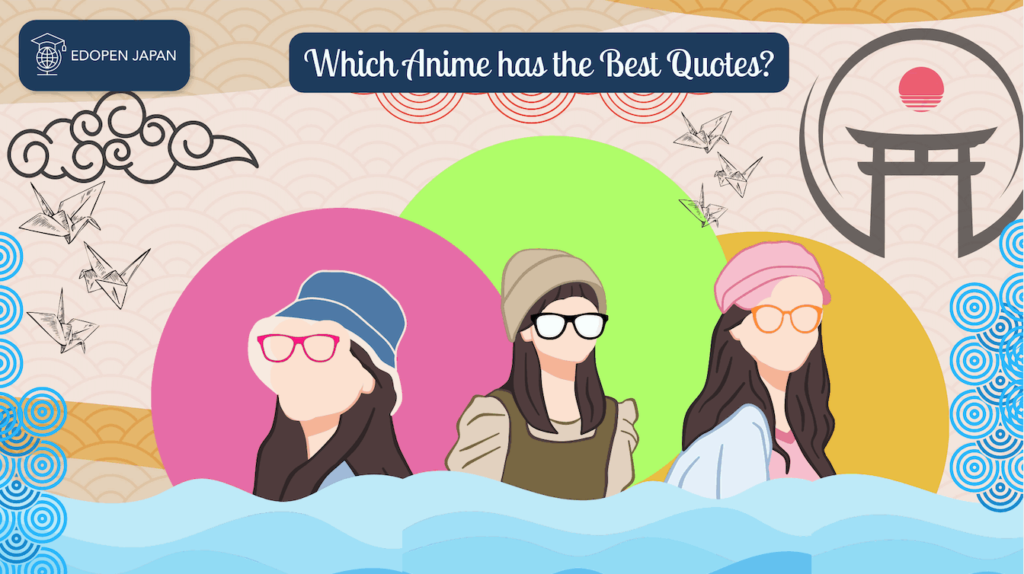
As an anime fan, you may already know the depth and meaning behind every dialog spoken by anime characters, especially in popular anime like Attack on Titan, Naruto, and One Piece.
As an anime fan, you must be wondering which anime has phrases or quotes that really inspire or make the audience drop a teardrop because the meaning of the dialog delivered is really touching.
There are some anime that are widely recommended and very popular such as:
(1) Attack on Titan
(2) Naruto
(3) One Piece
These three anime even have a huge fanbase on various social media. These phenomenal, touching and inspiring dialogues, phrases and even scenes are often cut by fans and republished by them to save and encourage. Do you have any other preferences? Please share them in the comment section
Summary
With that, we have come to the end of our journey of exploring famous anime quotes that are found in many animes that are used in various anime scenes and events. Do we use these infamous anime quotes in our everyday lives here in Japan? Maybe yes, maybe no. Honestly, not really.
Depending on the environment and situation, some phrases can be used in everyday life. Some such as “Ittai dou iu imi” and “Omae wa mou shindeiru” are only found and used in anime. Imagine someone asking you, “What the hell do you mean by that? Not a good feeling, is it?
As mentioned before, some phrases can still be used in everyday life, such as “Chotto matte” or “Ikuzo”. There are different ways to express and say such phrases, so it is a “truthfully not really” use of anime quotes in everyday conversation.
Since anime is a great source and way to learn Japanese, take it with a grain of salt. You never know when you might run into someone on the street in Japan who looks at you funny because you use anime quotes in your conversations. See you next time!

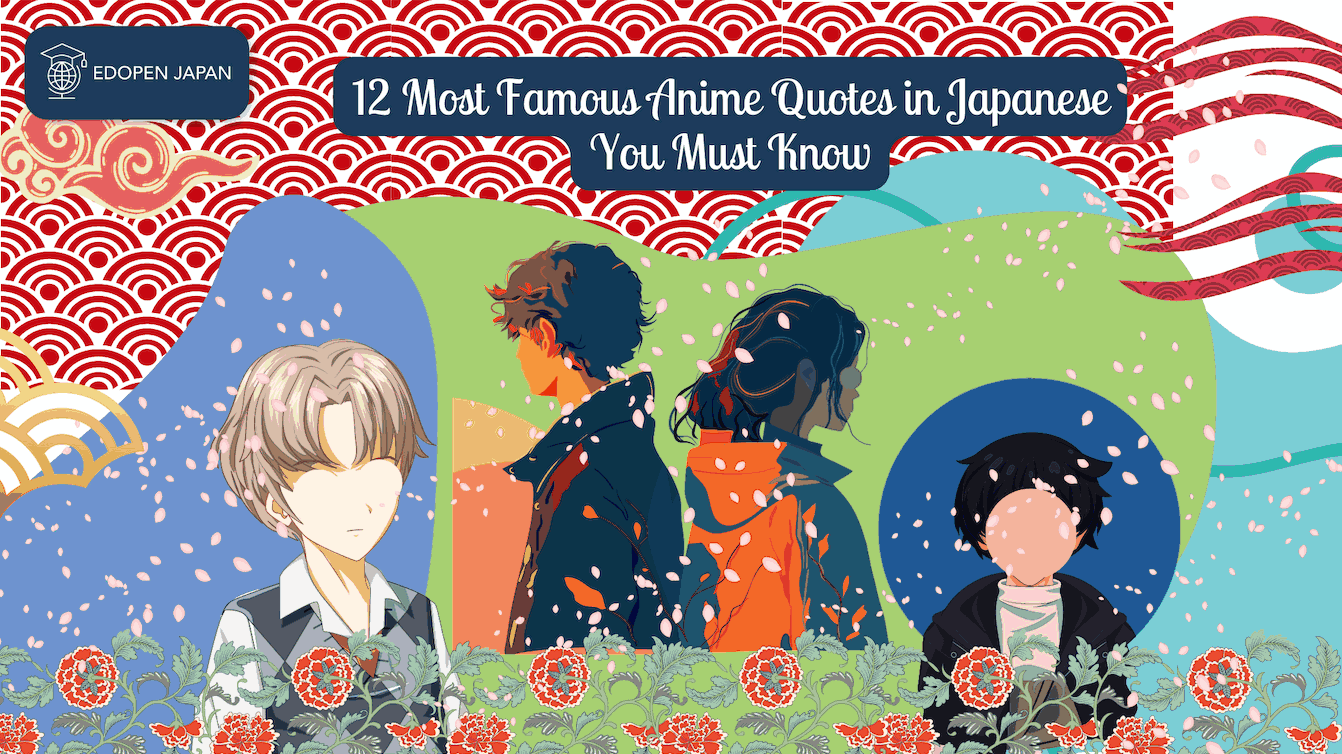
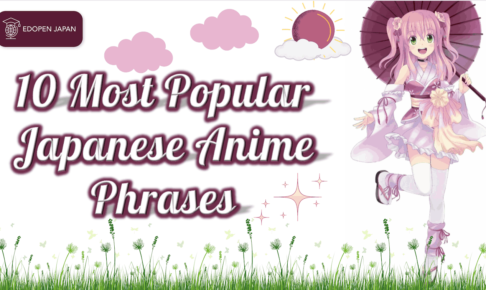












Leave a Reply